Spotting a fake German Shepherd puppy can be tricky, but there are some key indicators to look out for when buying a German Shepherd puppy, as we have discussed in this article.
Quick Overview
Firstly, check the puppy’s physical characteristics such as the shape of its head, ears, back, coat, and body. Authentic German Shepherds have a distinct appearance with a strong, muscular build and upright ears. Additionally, observe the puppy’s behavior – German Shepherds are known for being intelligent, alert, and confident, so if the puppy seems overly timid or aggressive, it may not be a true German Shepherd.
RELATED
- How to Know German Shepherd Breeder is Genuine?
- How to Know German Shepherd Puppy is Male or Female | Gender
- Are White German Shepherds Purebred?
- Is There a Mini German Shepherd Breed Exist?
- A Guide for Raising German Shepherd Puppy at Home
- How to Determine the Age of German Shepherd Puppy or Dog
- How Slant (Sloped) Back German Shepherds Were Created?
- How to Determine Most Desirable Traits in German Shepherd?
- 8 Ways to Identify Long Coat German Shepherd Puppy
|| DON’T MISS! Today’s Deals on Chewy – Pet Foods, Pet Products, Pet Supplies, Pet Toys and more. Additionally, visit our Etsy & Online Store for German Shepherd merchandise.
Following topics will be covered in this post:
- What is a Fake German Shepherd Puppy?
- What is the Ideal Age to Buy a German Shepherd Puppy?
- How To Spot a Fake German Shepherd Puppy | 10 Tips
01. What is a Fake German Shepherd Puppy?
A fake German Shepherd puppy typically refers to a situation where someone is trying to pass off a dog that is not a purebred German Shepherd as one. This can happen when breeders or sellers misrepresent the lineage of a puppy in order to sell it for a higher price or deceive buyers.
This is an example of a fake German Shepherd puppy. Though the puppy looks exactly like a German Shepherd puppy, but in reality it is not! It is a mixed breed. You can identify it from ears, as we have explained in the Section 4 that how you can recognize a German Shepherd puppy from its ears.
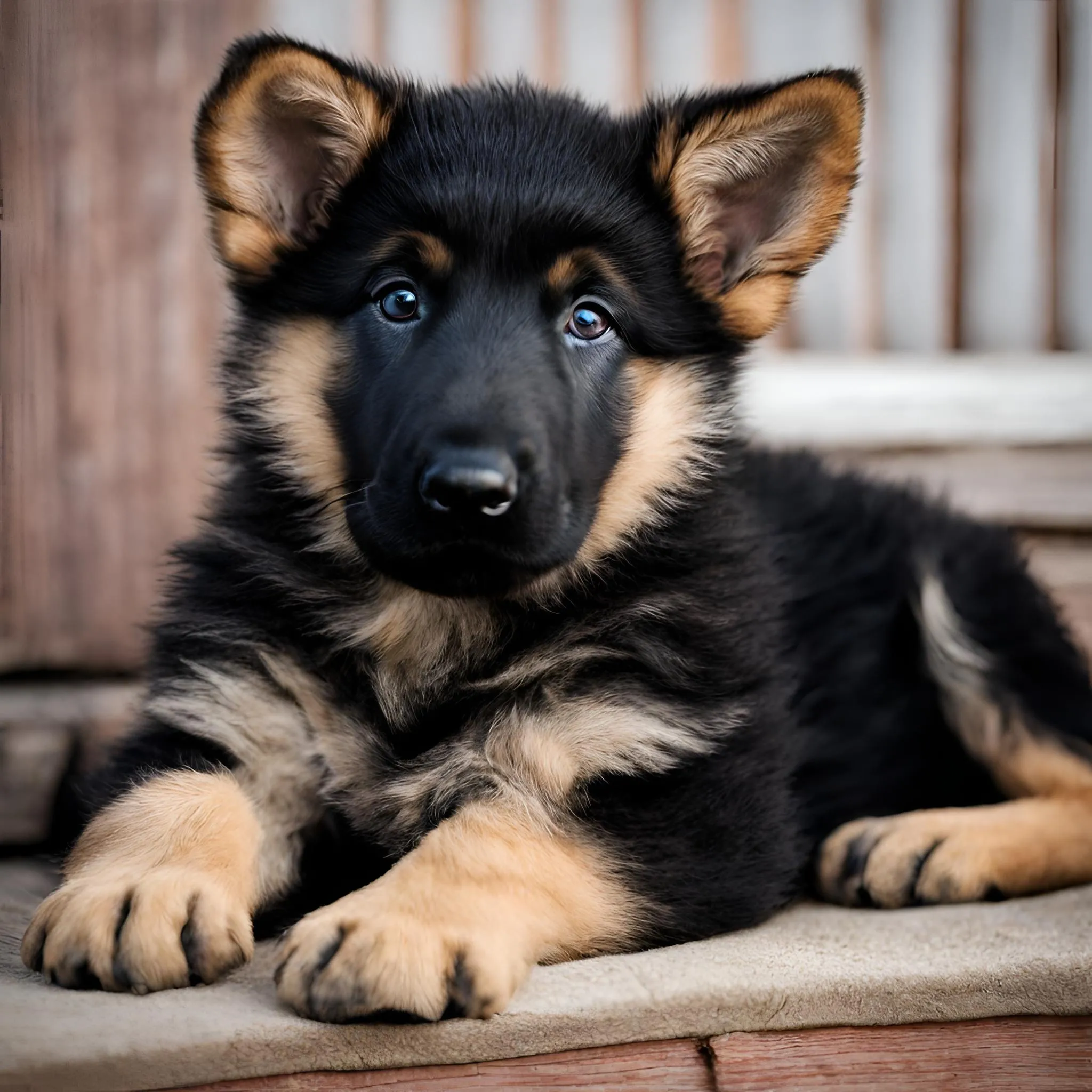
02. What is the Ideal Age to Buy a German Shepherd Puppy?
When looking to buy a German Shepherd puppy, it’s important to consider the right age. Ideally, puppies should stay with their mother and littermates until they are at least 2 months or 8 weeks old.
It is more easier to identify the purity of a 2-month-old German Shepherd puppy from its physical appearance and behavior than a 15-day-old or 1-month-old. This period allows a German Shepherd puppy to learn important social skills from their siblings and mother. Waiting until this age also ensures they have received crucial nutrients from their mother’s milk for proper growth and development. Additionally, by 8 weeks old, puppies are usually weaned and can transition to solid food more easily.
03. How to Spot a Fake German Shepherd Puppy | 10 Tips
Below are 10 useful tips or ways to spot a fake German Shepherd puppy and find a perfect one.
01. Get Pedigree Papers or Carry a DOG DNA Test
The best and most authentic ways to spot a genuine perfect German Shepherd puppy are (1) Ask for documentation and pedigree papers. It will confirm the puppy’s lineage and parentage (2) Carry out a dog DNA test. Read: How To Carry Out a Dog DNA Test Kit Using Embark & Wisdom Panel.
If you have any doubts, consider consulting with a reputable breeder or veterinarian for guidance | Related: 20+ German Shepherd Breeders In US | Buy GSD Puppies & Dogs.
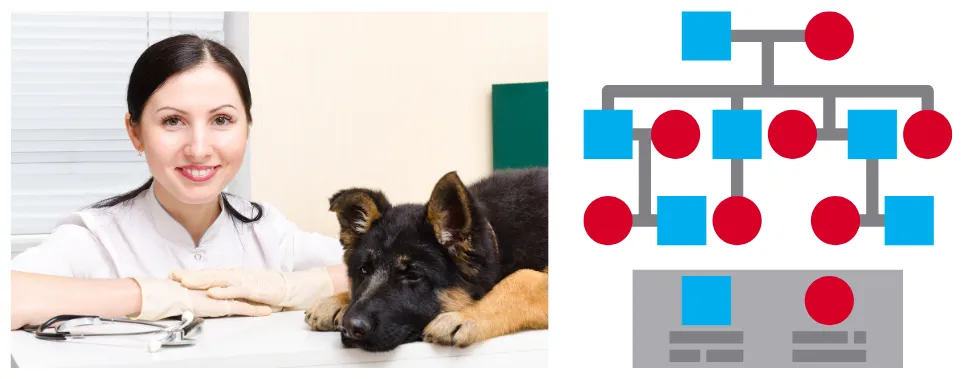
02. Ears
German Shepherd puppies typically have large, erect ears that stand up straight as they grow older. The distance between the ears of a German Shepherd puppy is smaller as compared to other breeds. The ears should be firm to the touch and not floppy. Additionally, German Shepherds have a distinct shape to their ears, with a slightly pointed tip and a wide base.
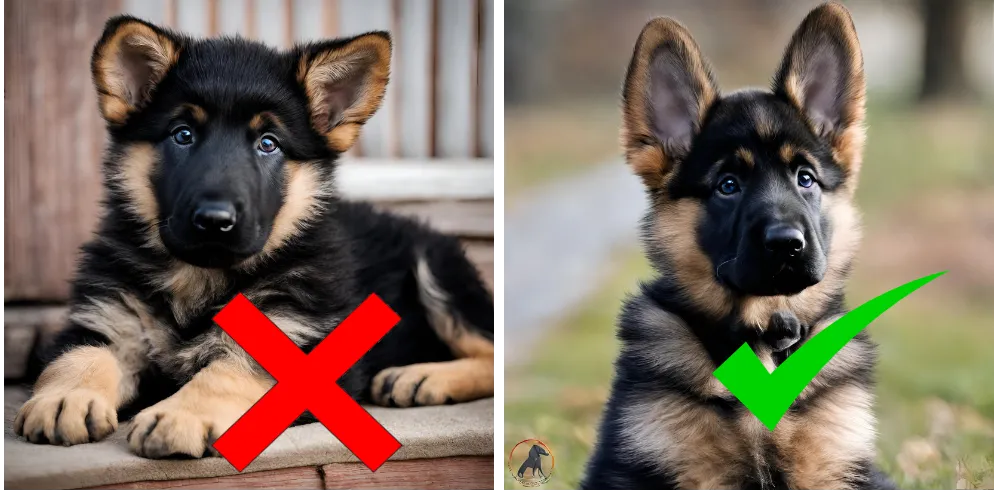
03. Head
The head shape of an original German Shepherd puppy is typically broad and slightly rounded, with a strong jawline. Overall, the head of a German Shepherd puppy reflects their noble and confident attitude, characteristics that have made them one of the most beloved dog breeds worldwide.
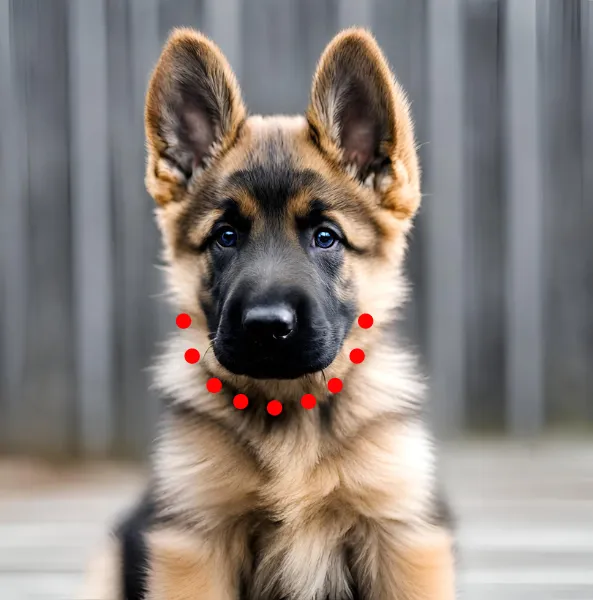
04. Tail
German Shepherds typically have long, bushy tails that are carried low. The tail should be covered in dense fur, often with a slight curve towards the end.
German Shepherd puppies tend to have tails that are in proportion to the rest of their body, not overly long or short. Their bushy tail hangs down when at rest and curves slightly upwards when alert.
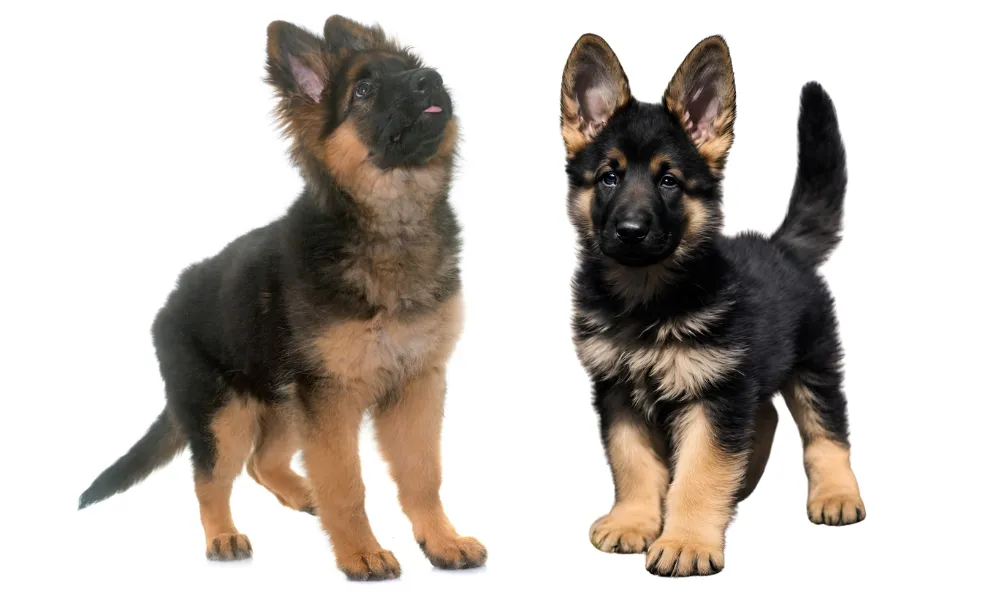
05. Back
Spotting a genuine German Shepherd puppy from its back can be done by observing certain key characteristics. German Shepherds are known for their strong and muscular build, with a straight back that slopes slightly towards the tail. They typically have a double coat, with a thick undercoat and a dense, medium-length outer coat.
Look for the signature saddle pattern on their back, which is a darker color than the rest of their body. By paying attention to these features of back, you can distinguish a pure German Shepherd puppy from a fake one.
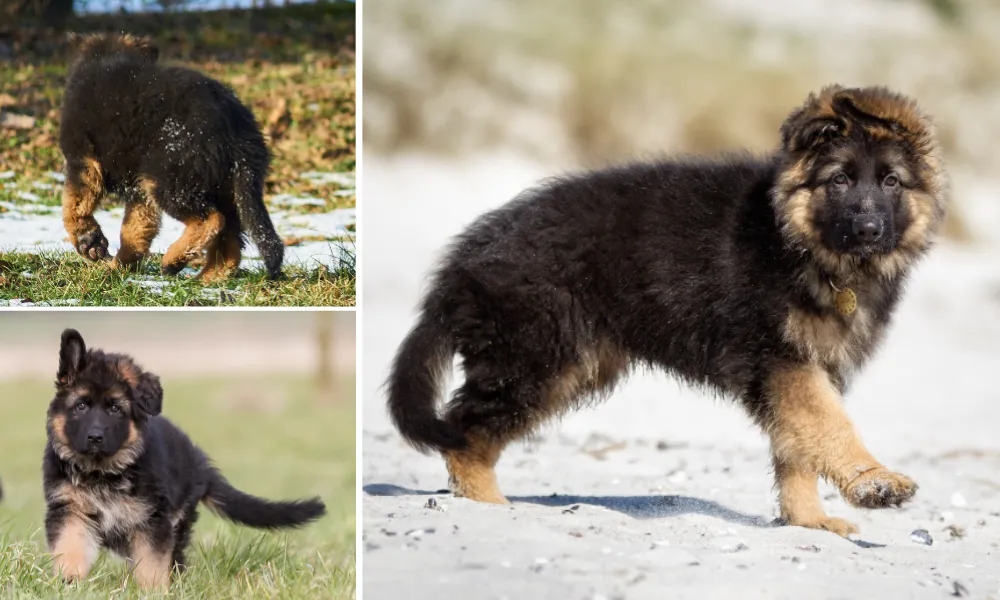
06. Chest
German Shepherds are known for their distinct body shape, with a deep chest that is broad and well-defined.
In puppies, this may not be as pronounced as in adult GSDs, but you can still observe the width and shape of the chest compared to the rest of the body.
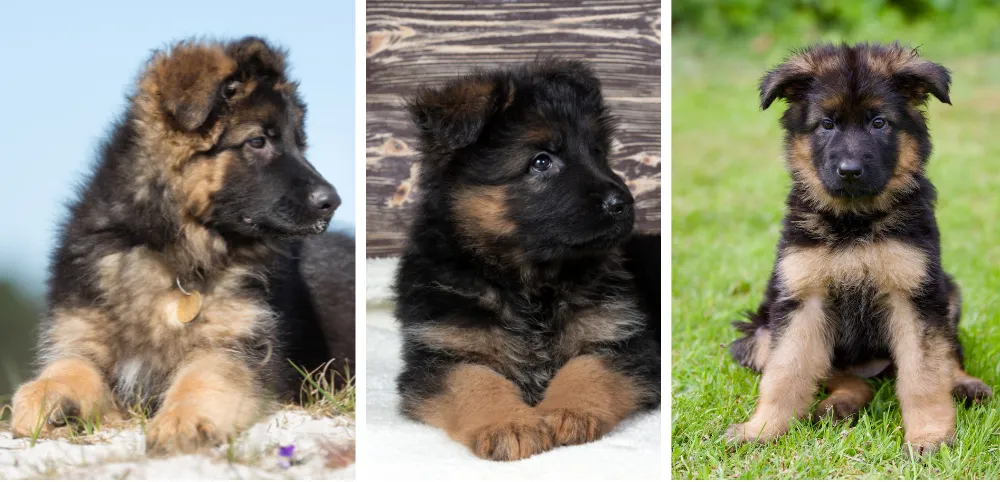
07. Paws
German Shepherd puppies typically have larger paws relative to their size, which can also give you a clue about their potential adult size. Their paws should also be well-padded, as this breed is known for its agility and athleticism.
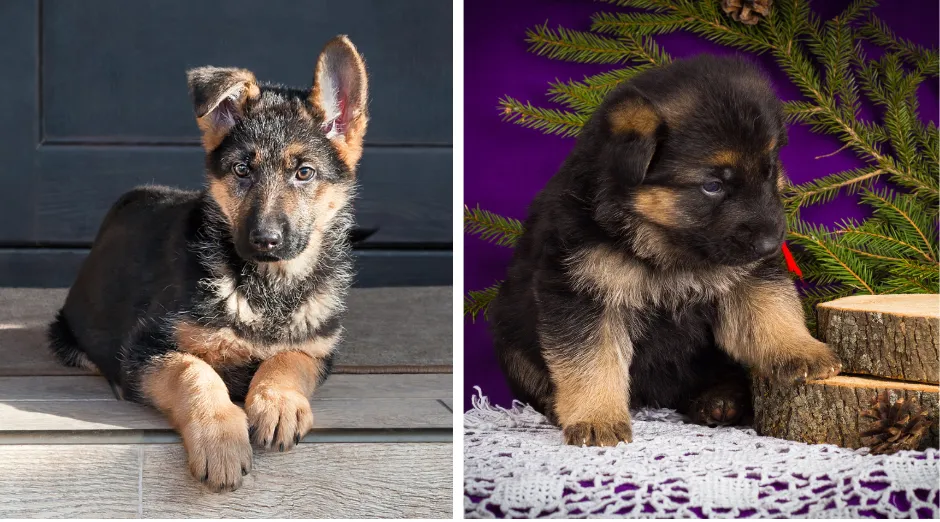
08. Eyes
German Shepherd puppies typically have dark, almond-shaped eyes that are set slightly obliquely (an eye in which the outer corners of the eye are higher than the inner corners). Their eyes are medium in size and convey a sense of intelligence and alertness. They also have a deep, soulful gaze that can be captivating.
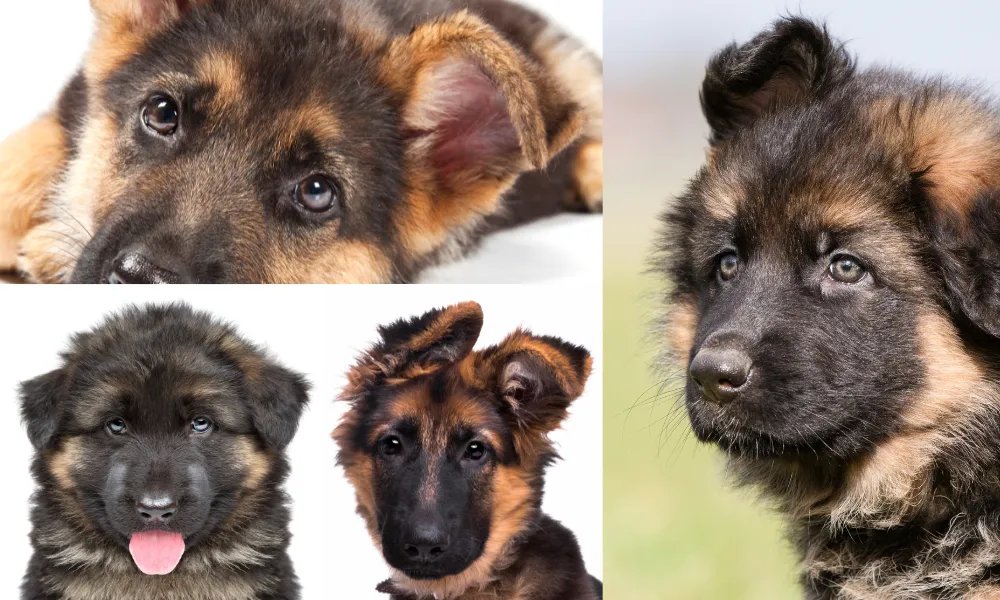
09. Coat
German Shepherds typically have a double coat consisting of a dense, slightly wiry outer coat and a softer undercoat. The color of their coat can vary, but the most common colors are black and tan, sable, or all black.
RELATED:
As puppies, they may have a mix of colors that will eventually develop into their adult coat. German Shepherd puppies often have a distinct pattern of darker fur on their back, a mask-like marking on their face, and lighter fur on their legs and chest.
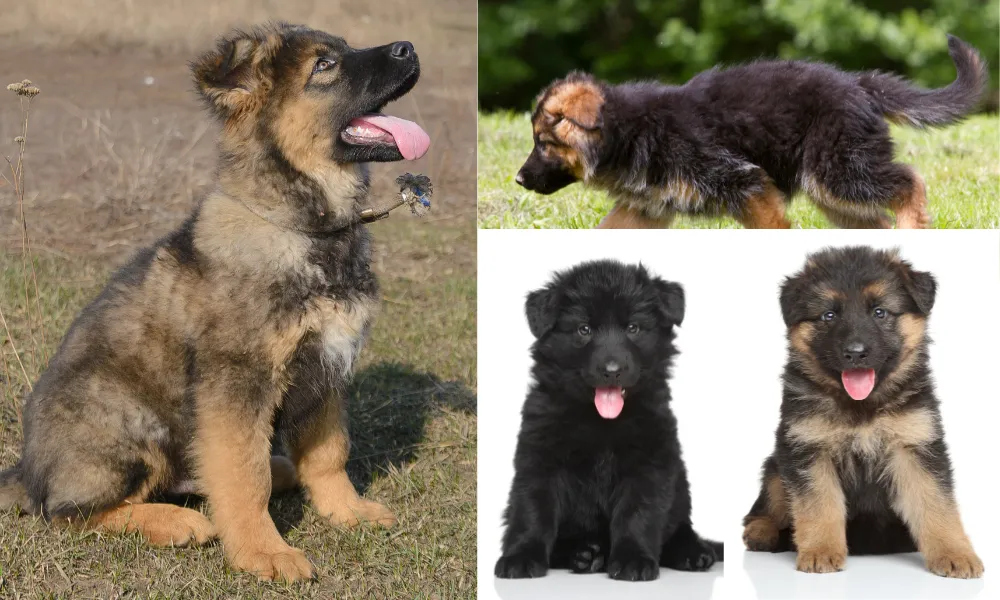
10. Behavior
Spotting a German Shepherd puppy from its behavior can be done by observing certain key traits. German Shepherds are known for their intelligence, loyalty, and protective nature. Look for signs of curiosity, alertness, and eagerness to learn, as these are common characteristics of the breed.
They may also exhibit natural herding instincts, such as nipping at heels or trying to round up objects. German Shepherd puppies tend to be confident and fearless, showing no signs of shyness or aggression. By paying attention to these behavioral cues, you can more easily identify a German Shepherd puppy among other breeds.
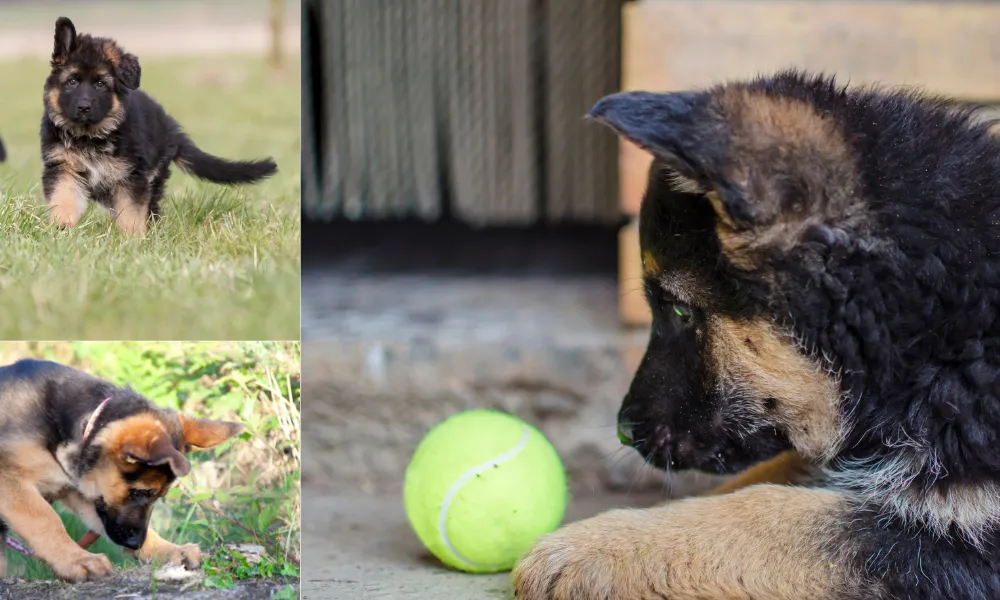
Final Thoughts
By observing the physical features as mentioned above, along with the puppy’s overall appearance and behavior, you can make a more informed guess about whether it is a genuine German Shepherd puppy or a fake German German puppy.
If you like this post then don’t forget to share with other people. Share your feedback in the comments section below.
Also Read
- 5 Different Types Of German Shepherd Breeds & Their Features
- How to Identify the Purity of German Shepherd Puppy | 5 Ways
- Is White German Shepherd a Good Family Dog?
- Straight Back German Shepherds | Types of Working Line GSDs
- Slant Back German Shepherds | Types of Showline GSDs
- Are Panda German Shepherds Purebred?

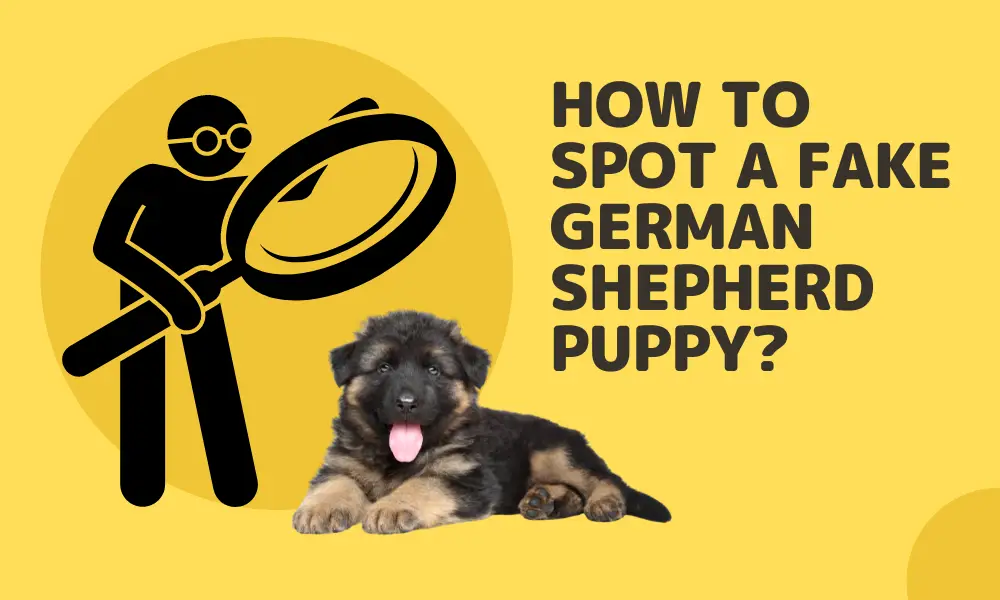
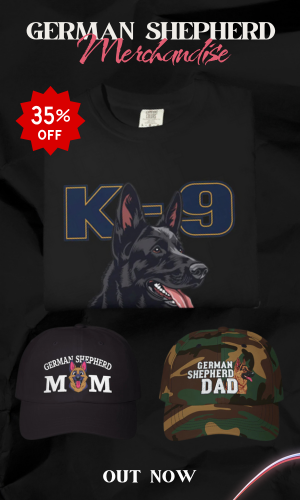

Leave a Reply